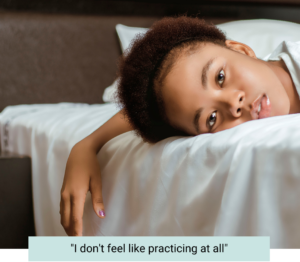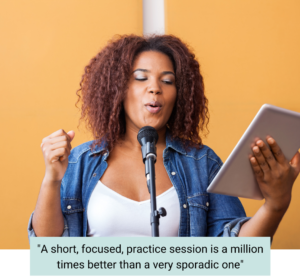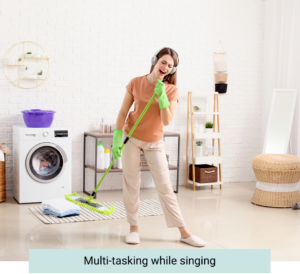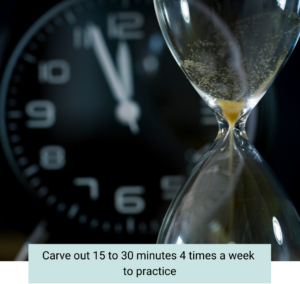Hey everyone! Today we are talking about practice. I have been having so many conversations about practicing that I thought this would be a great topic to write about. So I’m just going to dive right in.
Why do you resist practicing?
 The first thing I want to talk about is why you are resisting practicing. What I have personally noticed about myself is that when I really need to practice and I’m really putting it off, it’s usually because of some anxiety I have about the piece that I’m working on or a performance or a lesson. Something that’s really got me kind of like all knotted up. I feel like I’m kind of rejecting practicing on purpose to really just try to try to get out.
The first thing I want to talk about is why you are resisting practicing. What I have personally noticed about myself is that when I really need to practice and I’m really putting it off, it’s usually because of some anxiety I have about the piece that I’m working on or a performance or a lesson. Something that’s really got me kind of like all knotted up. I feel like I’m kind of rejecting practicing on purpose to really just try to try to get out.
A lot of times when I feel that resistance coming up to practicing, there’s two things I have to remind myself. The first thing is that just because you don’t feel like practicing doesn’t mean that you can’t go do it. A lot of times we get really, really caught up when in reality, the nitty gritty work of being a singer and actually putting the time in is not glamorous. As a professional singer, I can tell you that a lot of the time I spent practicing is kind of boring, it’s lonely, it’s something that has to be done. It’s part of the process and it’s the part of the process that you really need to fall in love with if you want to continue to pursue singing.
The second thing I want to say to you is that it is in your best interest to figure out the root cause of why you’re avoiding practicing. Is it because you don’t like the music that you’re working on? Is it because you don’t really like your teacher? Or maybe you feel a lot of pain in your voice whenever you practice? Are you being too hard on yourself? These are a lot of reasons that come up for people when they kind of notice that they’re in a pattern of avoidance. I noticed sometimes I get into patterns of avoidance when I get a really bad rejection that I wasn’t expecting, or that I was really set on.
Why do you need to stay focused while you’re practicing?
 The second thing I want to talk about is why you need to stay focused while you are practicing. A lot of people like to brag about how much time they practice or how much time they were in their practice room for. I guess that may be more like a conservatory thing that I’ve experienced. The fact of the matter is if you’re sitting in a practice room with your phone, then you’re not practicing. You’re just being super distracted by Instagram, Tiktok, Facebook, all of these millions of distractions that we have on a daily basis.
The second thing I want to talk about is why you need to stay focused while you are practicing. A lot of people like to brag about how much time they practice or how much time they were in their practice room for. I guess that may be more like a conservatory thing that I’ve experienced. The fact of the matter is if you’re sitting in a practice room with your phone, then you’re not practicing. You’re just being super distracted by Instagram, Tiktok, Facebook, all of these millions of distractions that we have on a daily basis.
A short, focused, practice session is a million times better than a very sporadic one. So it is best if you can really put away those distractions and focus on your practice. You can also set a timer and say for these 25 minutes, I’m going to do my warmup and work on some really intense agility exercises, and then on this Aria or, whatnot. If that timer is on, do not look at your phone because the moment you do you start checking one thing, then you decided to check another thing, then you realize that there’s an email that you should respond to, then someone texts you. By the time you like come out of that warp, 20 minutes have passed by, and those were the 20 minutes that you’ve set aside for your practice session.
Practice makes permanent
 The other thing I wanted to say is, practice makes permanent. A lot of you are practicing while you’re driving, doing your laundry, wandering around your house, picking up stuff, — that is not practicing. When you’re doing another task and practicing at the same time, your brain is rapidly switching between tasks. While you think you can do these tasks, like totally mindlessly, your brain is still moving on them. Your brain is rapidly switching, it’s always putting one activity on the back burner. Let’s you spend all week working on tongue tension, and then you’re singing while you’re doing laundry. What’s going to happen? You’re not going to be thinking about your tongue. Your tongue is going to go back to the old motion of being super far back or, tightening or curling. You’re spending that entire time where you’re doing laundry with your tongue tensed up, and you undo all the work that you did throughout the week.
The other thing I wanted to say is, practice makes permanent. A lot of you are practicing while you’re driving, doing your laundry, wandering around your house, picking up stuff, — that is not practicing. When you’re doing another task and practicing at the same time, your brain is rapidly switching between tasks. While you think you can do these tasks, like totally mindlessly, your brain is still moving on them. Your brain is rapidly switching, it’s always putting one activity on the back burner. Let’s you spend all week working on tongue tension, and then you’re singing while you’re doing laundry. What’s going to happen? You’re not going to be thinking about your tongue. Your tongue is going to go back to the old motion of being super far back or, tightening or curling. You’re spending that entire time where you’re doing laundry with your tongue tensed up, and you undo all the work that you did throughout the week.
I love that saying “practice makes permanent” especially as singers, because our instrument is part of our body, which is the only reason why we’re able to go do other things while we think we’re practicing. If you’re playing piano, you literally cannot do anything else other than play piano because you’re sitting at a piano. If you’re playing clarinet, you’re blowing into a clarinet that you have to hold and you can’t go full laundry while you’re playing a clarinet. We need to start treating our voices like that. We’re not trying to multitask while we practice.
Strategic and manageable routines and planning.
 When I asked my individual students, like, why don’t you practice? Why aren’t you practicing? The main thing that they tell me is because they think that they don’t have time, but when I asked them why they think they don’t have time, then they just go into like a launch about all the things that they’re working on.
When I asked my individual students, like, why don’t you practice? Why aren’t you practicing? The main thing that they tell me is because they think that they don’t have time, but when I asked them why they think they don’t have time, then they just go into like a launch about all the things that they’re working on.
So the better question is – can you carve out 15 to 30 minutes, four times a week to just practice? When I asked them like that, they’re like, oh yeah, I can do that. It’s almost like this huge mental block that we have, that we in order for a practice session to matter, it has to be like super long like an hour, like an hour and a half, or practice for two hours. You may be you thinking you were practicing for two hours, but maybe like 20 minutes of that you were in Instagram, 30 minutes of you were singing, then you took another 10 minute break. So let’s be honest about when are we actually practicing and stick to it because that’s what’s going to help us get over this mental hurdle of thinking that we don’t have time.
Leave a Reply